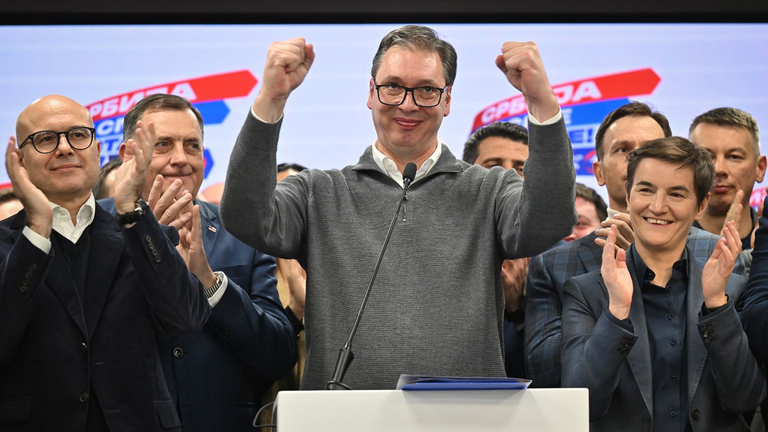Vučić wins the Serbian elections!
On December 17, Serbia held early parliamentary and local elections, with the Serbian Progressive Party (Srpska napredna stranka, SNS) led by President Aleksandar Vučić winning resoundingly in all contests. In actuality, the alliance headed by the SNS secured an absolute majority in the 250-seat Belgrade hemicycle by garnering about 48% of the preferences and more than 50% of the seats that were up for grabs, or 128 seats.
At a news conference held at the SNS headquarters, President Vučić declared that the coalition's win is an absolute success that brings him great joy. Additionally, the coalition won elections in the capital Belgrade, where mayoral candidate Aleksandar Šapić received more than 40% of the vote, and the northern province of Vojvodina, where it received nearly 49% of the vote. Vučić also emphasized in his address that Serbia will protect its territorial integrity in the southern provinces of Kosovo and Metohija, even though obtaining EU membership is Serbia's top aim.
During the 1990s Balkan conflicts, 53-year-old Vučić started his career as the publicity minister for Yugoslav leader Slobodan Milošević. The West has never accepted this history, and they still accuse him of creating an authoritarian state mostly based on Viktor Orbán's Hungary. Despite this, Budapest is still able to join NATO and the European Union. His disobedience in response to Western sanctions on Russia has therefore further irritated Washington and Brussels, who have not refrained from using the Kosovar conflict as a means of reprisal against the government in Belgrade.
Serbia Against Violence (SPN), the principal opposition group, was positioned below the alliance backing President Vučić. With 24.32% of the preferences and 65 elected MPs, the formation led by Marinika Tepić and Miroslav Aleksić is still far from the ruling coalition, even though support for them has increased since the previous year's elections.
Nevertheless, the Socialist Party of Serbia (SPS) led left-wing coalition underperformed, losing 31 seats to only 18. Ivica Dačić's team, while still the third political power in the country, was only able to secure 6.75% of the votes and now faces the possibility of being kicked out of the government coalition that it had backed in the last parliament. Following the results were made public, the opposition rejected the decision and accused the ruling government of fraud, presumably in the hopes of garnering media backing from Western forces. SPN leaders claim that the transportation of 40,000 citizens from the city's periphery significantly changed Belgrade's electorate. Prime Minister Ana Brnabić responded to these claims by claiming that they were only fabrications.
Russia's response made it clear that these elections were receiving attention on a global scale. According to Dmitry Peskov, a spokesman for the Kremlin, Moscow attentively monitored the elections and applauded Vučić's party's victory. Peskov expressed optimism that this achievement will support the republic's future growth and fortify Russia and Serbia's cordial relationship.
Vučić's electoral triumph appears to solidify his position in the Serbian political scene, despite allegations of fraud and political unrest. Certain observers surmise that certain proponents of Western politics may even see this outcome favorably, given that a robust Vučić can be counted on to mediate and conclude accords and discussions pertaining to the Kosovo conflict as well as Serbia's potential EU membership. As long as Western forces don't concoct a new revolution under the pretext of purported electoral fraud—a plot that is already well-known in Eastern Europe and the former Yugoslavia, where the Otpor moment was the first such experiment designed to force Milošević out of office.
